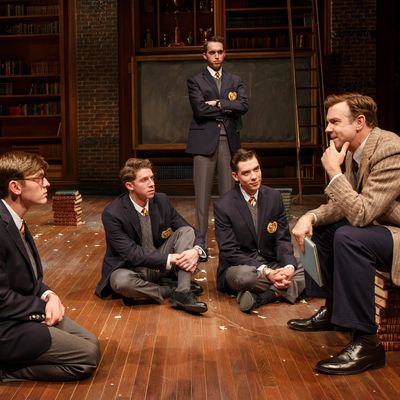
Though he has no prior professional theater credits, Jason Sudeikis holds the stage with confidence and verve as the inspiring prep-school teacher John Keating in the adaptation of Dead Poets Society that opens tonight at Classic Stage Company. This shouldn’t be a surprise for an alumnus of Saturday Night Live — and not just because of that show’s hilariously gory spoof of the mawkish 1989 film. As a longtime sketch comic, Sudeikis has the improviser’s knack for living in the moment and building on useful ideas from other actors; like Robin Williams, who made the role famous, he’s comfortable filling in the dialogue blanks with all sorts of amusingly doodled filigree.
But, oh, those blanks! The play, by Tom Schulman, based on his Academy Award–winning screenplay, is mostly holes, except when it’s goo. You no doubt remember how Keating, a newly hired firebrand at Welton Academy, shakes up the boys in Honors English with romantic poetry, unconventional assignments, and invocations to seize the day. “Make your lives extraordinary,” he exhorts. But you may not remember how vaporous all of this is, and — even for 1959, when the story is set — how middlebrow. (The boys admire “Invictus.”) Worse, the screenplay, like this play that minutely resembles it, burnishes Keating’s halo by setting him against a ludicrous backdrop of gray straw men. One of those straw men is, of course, the strict headmaster, Paul Nolan, who likes poetry taught as if it were science and rebels lashed on their pert bottoms. The other is the father of one of the boys, who sets the plot’s crisis in motion by refusing to let the poor soul try out for A Midsummer Night’s Dream lest acting scuttle his plans for medical school.
Oh, you read that right. The forces lined up against Keating and his wide-eyed virgins are not just Eisenhowerian but McCarthyesque, as if the weight of ordinary postwar conformity weren’t more than sufficient to break a few souls. (Schulman has said that the story is somewhat autobiographical; I am so sorry.) No extreme is extreme enough, especially no extreme of obviousness or cliché. One of the boys is in love with a girl who is dating a big dumb jock named Chetfield Danburry. Another, inspired by Keating’s cult of individuality, changes his name to Nuwanda. The club they form — the Dead Poets Society — meets in a local cave. Come on, a cave? Was the volcano booked? In the play’s milder moments, the result of these shortcuts around the hard work of inventing real life is merely annoying, like the dusty badinage that goes for a laugh but is too twee to land one:
NOLAN: Show me the heart unfettered by foolish dreams and I’ll show you a happy man.
KEATING: Only with dreams can men be truly free. ’Twas ever thus and ever thus will be.
NOLAN: Shakespeare?
KEATING: No. Keating.
The dramatic parts are worse, hammering their tin messages so hard they disintegrate. It’s bad enough that the story jumps its tracks in the last third, when a student’s suicide brings out the Spanish Inquisition. But the rationale for that suicide is so thinly developed — you couldn’t hang a poem on it, let alone a death wish — it makes you wonder whether a little conformity might have been just the ticket.
Onto all this scalding obviousness the director, John Doyle, in his first season as artistic director at CSC, pours the balm of simplicity. His double-duty aesthetic, which in musicals has often meant actors accompanying themselves on instruments, does a lot here to siphon off the sappiness of the material. The six boys (reduced from the movie’s seven) hand out Playbills as you enter and quietly hum collegiate-style anthems as scene-change music. Scott Pask’s set, sparing us the oaken desks and tufted leather, consists mostly of books, some stacked in piles for dramatic standing-upon. And, at least for the first two-thirds of the 90-minute play — the mild part — Doyle is almost completely successful in keeping the actors from falling into the pit of sentimentality. The boys are great: spontaneous, awkward, nicely but not unrealistically differentiated. (Zane Pais, as the sensitive one who stutters — Ethan Hawke in the movie — is especially good at implying a character with just a few scraps of information.) The arc of their response to Sudeikis is beautifully calibrated.
But once the story goes into overdrive, Doyle loses control; it’s as if the play were insisting on being bad despite his attempts to tame it. Or maybe because of those attempts. Doyle’s refusal to demarcate scenes and indicate changes in locale or time, refreshingly abrupt and nonchalant when the play’s ambitions seemed modest, leave you wondering, now that we’re in the Important Social Drama portion of the evening, what’s going on. Likewise, the radical pruning that is almost always Doyle’s first defense against writerly overindulgence no longer serves the material. He and Schulman have cut about 40 minutes from the movie, causing the events that remain in the final third to merge into a rat-a-tat of exclamation points. Worse, Keating nearly disappears from the plot, and when he does return, briefly and mostly silently, Sudeikis’s natural gifts are unavailing. You can’t improvise on nothing.
I’m afraid that may be the message of Dead Poets Society, which is, after all, about finding your own voice by incorporating those of the past. It only works with the great ones. That’s why boomer retreads like this — I can’t speak for the stage adaptation of Terms of Endearment that recently opened at 59E59, which I haven’t seen yet — are likely to disappoint both nostalgists and new-thrill seekers. They aspire to the middlebrow and treat theater as if it were science.
Dead Poets Society is at Classic Stage Company through December 11.

